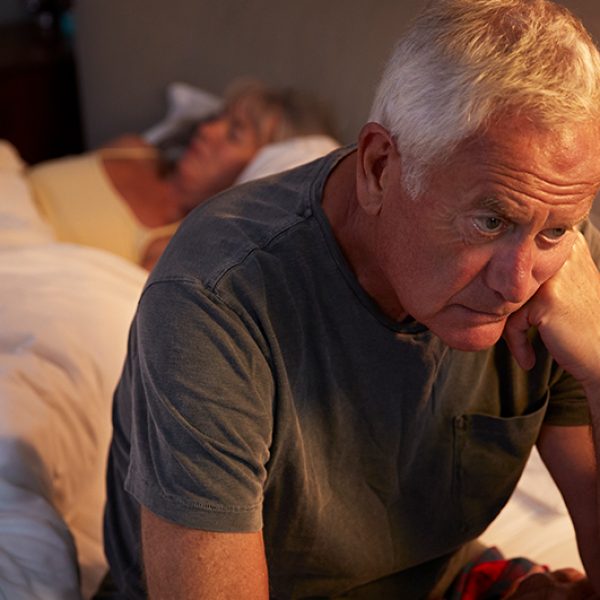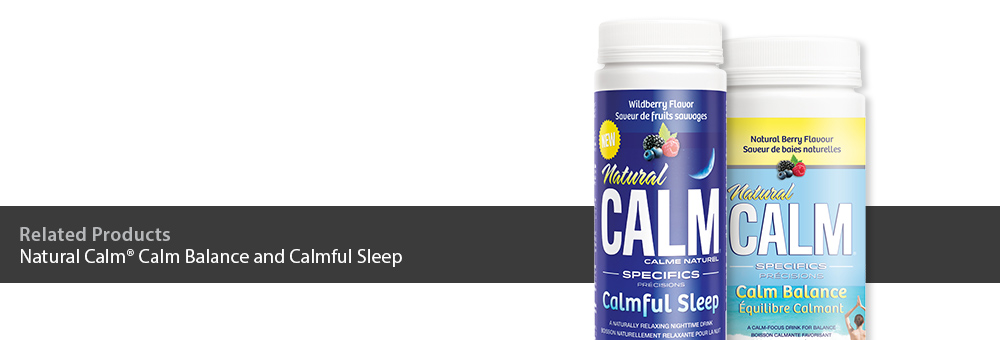

Natural supplements to fight insomnia
Some people are blessed with the ability to sleep anytime, anywhere, under any conditions. But if you struggle with sleep, you’re not alone. Sleep disorders affect 40% of adult Canadians.
4 in 10 of us experience symptoms of insomnia at least three times a week. For some, that means not being able to get to sleep, while for others it means waking in the night or too early in the morning.
When you can’t sleep, your mental health, physical performance, mood and every aspect of well being are affected.
Getting a good night’s sleep often depends on the fine art of sleep hygiene. But what exactly is sleep hygiene? It’s the combination of practices and habits that allow us to sleep well at night and feel alert during the day. These include:
- Setting regular sleep and wake times
- Limiting naps during the day
- Including exercise in your daily routine
- Getting enough natural light during the day
- Avoiding late evening exposure to artificial light, including screens
- Creating a dark, cool, quiet and comfortable sleep environment
- Keeping to a regular bedtime routine that triggers your body’s natural cues to sleep
- Avoiding stimulants, alcohol and foods that disrupt sleep
But what if these basic sleep hygiene practices aren’t enough?
Many people with occasional insomnia turn to pharmaceutical treatments. But over-the-counter and prescription sleep aids aren’t ideal because they’re often sedatives, associated with addiction and other side effects.
However, some natural supplements can help normalize sleep safely. Here are four research-supported ingredients for a better night’s sleep:
1. Magnesium: We have long known that magnesium promotes quiet sleep (Dralle & Bodeker, 1980). Recent research has shown that a daily magnesium supplement increases sleep time and sleep efficiency.
2. L-Theanine: This amino acid is a safe natural sleep aid that has been found to “promote relaxation without drowsiness” and without sedation.
3. GABA: Gamma-aminobutyric acid (GABA) is a neurotransmitter that is believed to relax the nervous system and reduce anxiety. Studies have reported a close association between sleep and the GABAergic system.
4. Melatonin: This well-known insomnia treatment works by regulating the circadian rhythm. Melatonin use can significantly improve sleep quality and is not associated with dependence, tolerance, rebound insomnia or withdrawal symptoms.
Magnesium, L-Theanine and GABA can all be taken during the day or at night. They do not cause drowsiness. Rather, these supplements support states of mental and physical relaxation required to sleep. Melatonin, however, is intended for use at night, before bed.
These four supplements are considered highly-safe for healthy adults. If you have a known health condition, consult your doctor before taking any new supplement.
All four of these research-based sleep supplements can be found in Calmful Sleep by Natural Calm. It’s a naturally-relaxing nighttime drink for extra sleep support.
Calmful Sleep is formulated for adults. For children, a simple magnesium supplement like Natural Calm Kids can improve sleep. Consult your healthcare provider for advice on the right supplements for your child.
To support daytime alertness, focus and calm energy, try new Calm Balance by Natural Calm. It’s a fruit-flavoured supplement drink that includes magnesium, l-theanine, and vitamins for energy metabolism, brain development, mood, cognition and more.
By Anna O’Byrne and Laura Young, Honours B.Sc., Student of the Canadian College of Osteopathy
References:
1. Abbasi, B., Kimiagar, M., Sadeghniiat, K., Shirazi, M., Hedayati, M., & Rashidkhani, B. (2012). The effect of magnesium supplementation on primary insomnia in elderly: A double-blind placebo-controlled clinical trial. The Official Journal of Isfahan University of Medical Sciences, 17(12), 1161–1169.
2. Abdou, M. A., Higashiguchi, S., Horie, K., Kim, M., Hatta, H., & Yokogoshi, H. (2006). Relaxation and immunity enhancement effects of gamma-aminobutyric acid (GABA) administration in humans. BioFactors, 201–208.
3. American Academy of Sleep Medicine, Auger, R. R., Burgess, H. J., Emens, J. S., Deriy, L. V., Thomas, S. M., & Sharkey, K. M. (2015). Clinical Practice Guideline for the Treatment of Intrinsic Circadian Rhythm Sleep-Wake Disorders: Advanced Sleep-Wake Phase Disorder (ASWPD), Delayed Sleep-Wake Phase Disorder (DSWPD), Non-24-Hour Sleep-Wake Rhythm Disorder (N24SWD), and Irregular Sleep-Wake Rhythm Disorder (ISWRD). An Update for 2015. Journal of Clinical Sleep Medicine, 11(10), 1199–1236. http://doi.org/10.5664/jcsm.5100
4. Brevik, E. J., Lundervold, A. J., Halmøy, A., Posserud, M. B., Instanes, J. T., Bjorvatn, B., & Haavik, J. (2017). Prevalence and clinical correlates of insomnia in adults with attention-deficit hyperactivity disorder. Acta Psychiatrica Scandinavica. http://doi.org/doi: 10.1111/acps.12756
5. Cortesi, F., Giannotti, F., Sebastiani, T., Panunzi, S., & Valente, D. (2012). Controlled-release melatonin, singly and combined with cognitive behavioural therapy, for persistent insomnia in children with autism spectrum disorders: a randomized placebo-controlled trial. Journal of Sleep Research, 21(6), 700–709. http://doi.org/10.1111/j.1365-2869.2012.01021.x
6. Cuesta, M., Boudreau, P., Cermakian, N., & Boivin, D. B. (2017). Skin Temperature Rhythms in Humans Respond to Changes in the Timing of Sleep and Light. Journal of Biological Rhythms.
7. Dietz, C., & Dekker, M. (2017). Effect of Green Tea Phytochemicals on Mood and Cognition. Current Pharmaceutical Design.
8. Dralle, D., & Bodeker, R. H. (1980). Serum magnesium level and sleep behavior of newborn infants. European Journal of Pediatrics, 134(3), 239–243.
9. Held, K., Antonijevic, I. A., Kunzel, H., Uhr, M., Wetter, T. C., Golly, I. C., et al. (2002). Oral Mg(2+) supplementation reverses age-related neuroendocrine and sleep EEG changes in humans. Pharmacosychiatry, 35(4), 135–143.
10. Lyseng-Williamson, K. A. (2012). Melatonin prolonged release: in the treatment of insomnia in patients aged ≥55 yrs. Drugs & Aging, 29(11), 911–923.
11. Meverhoff, D., Mon, A., Metzler, T., & Neylan, T. C. (2014). Cortical gamma-aminobutyric acid and glutamate in posttraumatic stress disorder and their relationships to self-reported sleep quality. Sleep, 37(5), 893–900.
12. Misra, A., & Sharma, P. K. (2017). Pharmacotherapy of Insomnia and Current Updates. J Assoc Physicians India, 65(4), 43–47.
13. Petroff, O. A. (2002). GABA and glutamate in the human brain. Neuroscientist, 8(6), 562–573.
14. Rao, T. P., Ozeki, M., & Juneja, L. R. (2015). In Search of a Safe Natural Sleep Aid. The Journal of the American College of Nutrition, 34(5), 436–437.
15. Scheer, F. A. J. L., Morris, C. J., Garcia, J. I., Smales, C., Kelly, E. E., Marks, J., et al. (2012). Repeated Melatonin Supplementation Improves Sleep in Hypertensive Patients Treated with Beta-Blockers: A Randomized Controlled Trial. Sleep, 35(10), 1395–1402. http://doi.org/10.5665/sleep.2122
16. Schousboe, A., & Waagepetersen, H. (2007). GABA: homeostatic and pharmacological aspects. Progress in Brain Research, 9–19.
17. Sleep Foundation: Sleep Disorders. (n.d.). www.sleepfoundation.org. Retrieved June 7, 2017.
18. Science Daily: Sleep disorders affect 40 percent of Canadians. (2011, September 8). www.sciencedaily.com. Retrieved June 9, 2017.
19. Sleep Education: Delayed Sleep-Wake Phase – Overview & Facts. (2017). www.sleepeducation.org. Retrieved June 7, 2017.
20. Swaminathan, K., Klerman, E. B., & Phillips, A. (2017). Are Individual Differences in Sleep and Circadian Timing Amplified by Use of Artificial Light Sources? Journal of Biolo, 32(2), 165–176. http://doi.org/doi: 10.1177/0748730417699310
21. Volpe, S. L. (2013). Magnesium in disease prevention and overall health. Advanced Nutrition, 4(3), 378S–83S.
22. Wade, A. G., Crawford, G., Ford, I., McConnachie, A., Nir, T., Laudon, M., & Zisapel, N. (2011). Prolonged release melatonin in the treatment of primary insomnia: evaluation of the age cut-off for short- and long-term response. Current Medical Research and Opinion, 27(1), 87–98.
23. Watanabe, M., Maemura, K., Kanbara, K., Tamayama, T., & Hayasaki, H. (2002). GABA and GABA receptors in the central nervous system and other organs. International Review of Cytology, 213, 1–47.
24. White, D. J., de Klerk, S., Woods, W., Gondalia, S., Noonan, C., & Scholey, A. B. (2016). Anti-Stress, Behavioural and Magnetoencephalography Effects of an L-Theanine-Based Nutrient Drink: A Randomised, Double-Blind, Placebo-Controlled, Crossover Trial. Nutrients, 8(1).
25. Zhang, L., Guo, H. L., Zhang, H. Q., Xu, T. Q., He, B., Wang, Z. H., et al. (2017). Melatonin prevents sleep deprivation-associated anxiety-like behavior in rats: role of oxidative stress and balance between GABAergic and glutamatergic transmission. American Journa of Translation Research, 9(5), 2231–2242.

